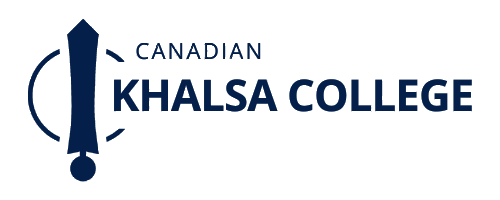Instructional standards Policy
Instructional standards Policy
To assess pedagogical skills and related practices, Canadian Khalsa College provides instructors with
regular performance reviews. The Instructional Standards Policy outlines the formal performance
reviews conducted by Canadian Khalsa College as follows.
- Pedagogical Skills and Practices:
- Canadian Khalsa College instructors are expected to maintain the following pedagogical
skills and practices:- Design interesting, appropriate, thoughtful lectures, and student-centred learning activities.
- Encourage students to work collaboratively, contribute to class discussions, ask questions, and seek help.
- Provide students with clear explanations, concrete examples, reasonable challenges, and regular feedback.
- Understand and support students with diverse backgrounds and cultures.
- Be aware of the needs of students whose first language is not English and take these needs into consideration in all facets of course preparation and delivery.
- Prepare effectively designed evaluations that include a variety of testing formats.
- Check on students regularly, support their individual learning, and inform them individually of their progress.
- The Senior Educational Administrator conducts formal checks of an instructor’s
pedagogical skills and practices through:- Class Observations
- Course Evaluations
- Annual Performance Reviews.
- Instructors who do not demonstrate suitable pedagogical skills and related practices
may be subject to non-renewal of contract.
- Canadian Khalsa College instructors are expected to maintain the following pedagogical
- Class Observations:
- Canadian Khalsa College instructors are assessed on their instructional practices and class management through regular class observations:
- New instructors at Canadian Khalsa College are observed once a semester for each of their first three semesters at the college.
- Instructors who have instructed at the college for three consecutive semesters are observed annually.
- The instructional performance criteria used to assess instructors is based on qualities including but not limited to:
- classroom communication with students;
- classroom exercises and activities;
- classroom utilization of resource material;
- lesson planning;
- classroom management;
- encouragement of student class participation;
- availability to students before and after classes;
- assessment and grading skills;
- punctuality and time-use;
- enthusiasm for teaching.
- Course Evaluations:
- Each term following a course’s midterm period, students are asked to evaluate the performance of their instructors and the overall quality of their courses through the Course Evaluation Questionnaire.
- All student responses are given voluntarily and anonymously.
- The students are asked to provide ratings to themes on the Course Evaluation
- Punctuality;
- Time allotment;
- Level of organization;
- Level of preparedness;
- Knowledge of subject;
- Clarity of presentation;
- Clarity of explanation of goals and evaluation;
- Fairness in grading;
- Promptness in returning assignments;
- Encouraging of questions;
- Enthusiasm;
- Delivery of overall good learning experience.
- The Office Coordinator is responsible for administrating course evaluations and will
perform the following procedure:- Schedule course evaluations following the course’s midterm period; course evaluations should be scheduled in the first or last ten minutes of class time.
- Notify instructors in advance of the course evaluation; notification should be made a week prior to the course evaluation.
- Distribute, monitor, and collect all Course Evaluation Questionnaires; the instructor may not be in the room during this time.
- Transcribe any comments made by students and generate a Course Evaluation Summary for each class.
- Distribute Course Evaluation Summaries to the SEA for review and place a copy in the instructor’s employee file.
- Once the final course grades have been submitted for the term, the Office Coordinator will distribute the Course Evaluation Summaries to the instructors.
- If the SEA feels an instructor’s performance requires special attention, the SEA will discuss the course evaluation with the instructor directly; the Senior Educational Administrator may also choose to attend such discussions.
- Canadian Khalsa College encourages honest feedback from students by ensuring that all
responses remain anonymous; under no circumstance will:- Course Evaluation Questionnaires be available to instructors.
- Course Evaluation Summaries be distributed to instructors prior to the submission of final course grades.
- Annual Performance Reviews:
- On an annual basis, the Senior Educational Administrator will conduct individual, in-person performance reviews with their assigned instructors; these meetings are documented using the Annual Performance Review form.
- The SEA will provide an overall assessment of the instructor’s performance based on previous Class Observation Reports, Course Evaluation Summaries, and any related documentation.
- The SEA and instructor will work together to:
- Review professional development goals set out in previous Annual Performance Reviews.
- Assess the instructor’s performance over the past year.
- Develop an action plan and timeframe for the instructor’s individual professional development for the following year.
- Once completed to the satisfaction of the SEA and instructor, the following procedure is
observed:- Both parties will sign the Annual Performance Review;
- The SEA will provide the instructor with a copy of the Annual Performance Review and submit the signed original to Office Coordinator for review and filing.
- The SEA will place a copy in the instructor’s employee file.
- All original Annual Performance Reviews are kept in the instructor’s employee file.
- Non-renewal of Contract:
- If a Class Observation, Course Evaluation, and/or Annual Performance Review does not reflect the quality of instruction mandated by Canadian Khalsa College, the Senior Educational Administrator, in consultation with the Executive Director, may decide to:
- no longer contract the instructor for future classes;
- rescind all offers of employment.
- When possible, the Senior Educational Administrator will inform the instructor of the college’s decision regarding non-renewal of contract after the completion of any current
contracts. - For instances where a Class Observation, Course Evaluation, and/or Annual Performance Review indicates that an instructor has violated Canadian Khalsa College’s code of
conduct, the “Conduct Policy” will also apply. - Based on the severity of concerns raised in the Class Observation, Course Evaluation, and/or Annual Performance Review, the Senior Educational Administration may decide to terminate the instructor’s contract as outlined in Canadian Khalsa College’s
“Termination and Resignation Policy.”
- If a Class Observation, Course Evaluation, and/or Annual Performance Review does not reflect the quality of instruction mandated by Canadian Khalsa College, the Senior Educational Administrator, in consultation with the Executive Director, may decide to:
- Canadian Khalsa College instructors are assessed on their instructional practices and class management through regular class observations:
Canadian Khalsa College is regulated by the Private Training Institutions Branch of the Ministry of Advanced Education and Skills Training. www.privatetraininginstitutions.gov.bc.ca

